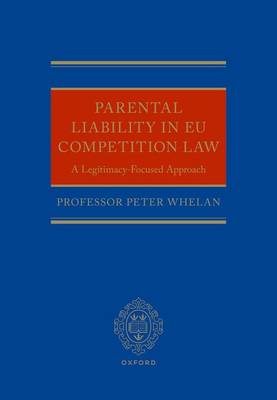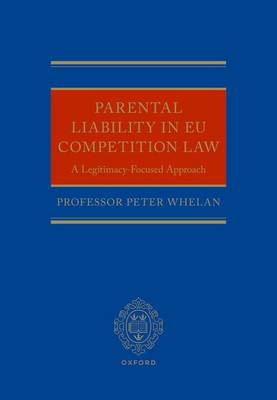
- Retrait gratuit dans votre magasin Club
- 7.000.000 titres dans notre catalogue
- Payer en toute sécurité
- Toujours un magasin près de chez vous
- Retrait gratuit dans votre magasin Club
- 7.000.0000 titres dans notre catalogue
- Payer en toute sécurité
- Toujours un magasin près de chez vous
Parental Liability in EU Competition Law
A Legitimacy-Focused Approach
Peter Whelan
Livre relié | Anglais
410,95 €
+ 821 points
Description
In enforcing EU competition law, the Commission employs a unique doctrine of parental antitrust liability: it imposes fines on the parent company of an infringing subsidiary in cases where the parent exercises decisive influence over the subsidiary's commercial policy. Critics of this contentious aspect of EU competition law believe that the doctrine is unfair, ineffective, obscure, disproportionate, contrary to due process, and based upon a dubious, if not extremely flimsy, justificatory foundation. Such criticism raises serious and unanswered questions about the legitimacy of the Commission's efforts to enforce competition law. Parental Liability in EU Competition Law: A Legitimacy-Focused Approach is the first monograph to be dedicated to this controversial topic. Written by Professor Peter Whelan, the book contends that, although the general concept of parental liability can be justified in principle, the current EU-level doctrine of parental antitrust liability in fact suffers from a distinct and problematic lack of legitimacy. More specifically, the said doctrine displays significant deficiencies with respect to effectiveness, fairness, and legality. Given this undesirable state of affairs, Parental Liability in EU Competition Law offers a fully-rationalised, reformulated approach to parental antitrust liability for EU competition law violations that is built around the notion of parental fault. That approach provides a solid normative account of how to impose parental antitrust liability in a manner that is theoretically robust, effective in practice, fair in substance, and legally sound.
Spécifications
Parties prenantes
- Auteur(s) :
- Editeur:
Contenu
- Nombre de pages :
- 624
- Langue:
- Anglais
Caractéristiques
- EAN:
- 9780198844839
- Date de parution :
- 25-11-23
- Format:
- Livre relié
- Format numérique:
- Genaaid
- Dimensions :
- 43 mm x 104 mm
- Poids :
- 1065 g

Les avis
Nous publions uniquement les avis qui respectent les conditions requises. Consultez nos conditions pour les avis.






